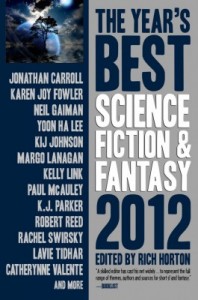“The Smell of Orange Groves” by Lavie Tidhar will be appearing in Prime’s forthcoming Year’s Best Science Fiction and Fantasy: 2012 edited by Rich Horton. Pre-order here!
I noticed connections in this story to other stories of yours as far as the setting goes, like Cloud Permutations, for example. For those who would like to read more of your stories in this setting, where should they look. Do you have any other upcoming works set in this same world you would like to mention?
Most of my science fiction stories take place in a sort of shared universe / future history, including, as you mentioned, my novella Cloud Permutations and my forthcoming novel from PS Publishing, Martian Sands.
“The Smell of Orange Groves”, however, takes place within a cycle of short stories all set in the Central Station area of Tel Aviv, somewhere in the future. A couple of others have also been published, and I hope, once I’m done with them, to publish them together as a mosaic novel.
Set in future Tel Aviv, this story mentions the ongoing conflict in the Middle East between Jewish and Muslim culture and notes that, in this fictional future, it is still ongoing. Does this sum up your opinion on this matter? Do you feel there can ever be a resolution to this conflict to satisfy both sides?
Well, in the Central Station stories, this has been resolved – not in a way Israel would particularly like, I suppose! – with the Palestinians returning to their lands. In a way, I was more interested in exploring the reality of that conflict from the eyes of the immigrants/refugees who have been coming to the region – Tel Aviv now has over a quarter of a million economic migrants and refugees from Asia and Africa, and they’re really the ones populating the Central Station stories.
I am currently working on a picture book, with Israel artist Adi Elkin, called It’s Hard To Be A Filipino in Hebrew, which explores it again in a contemporary setting.
I can’t help but notice that many of your stories have an “outsider” as the central narrator. This “outsider” varies from story to story — in “The Smell of Orange Groves” it is a first generation immigrant, for example. What, in your opinion, makes an “outsider” such a compelling point of view character in a work of fiction?
I guess, yes, I come at things from an outsider perspective, which has to do with living as an outsider in different countries most of my life, maybe. It’s a useful point of view but in the Central Station stories I actually tried to do the opposite, it’s very much about a place where people are from, where people are born and live and die. But then again, who can resist the old Stranger Comes to Town ploy…
